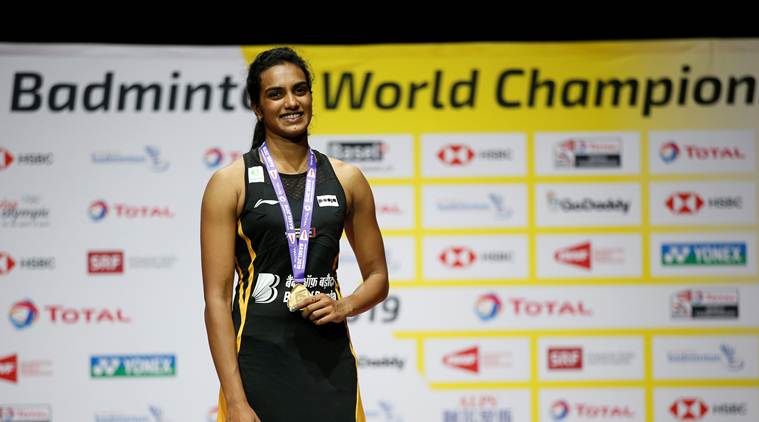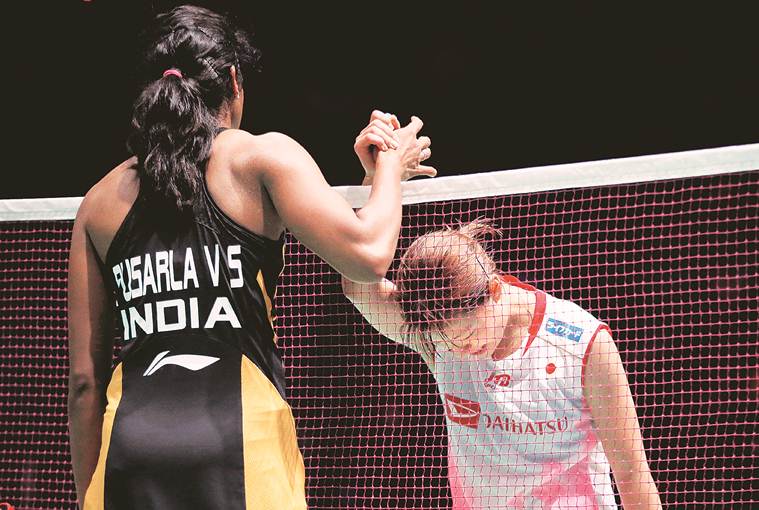
Because women’s singles badminton is so mesmerised by sophisticated talent and wrist-work currently, it has forgotten what savagery looks like. Two of the most consummate artists — Tai Tzu-Ying and Ratchanok Intanon inhabit the badminton planet, which also has the Japanese Nozomi Okuhara and Akane Yamaguchi, who pack in a lot into their criss-crossing marathons around the court. The Chinese, who often specialise in playing like beasts, are seriously down on firepower. The women’s game is far too beautiful for brutality to get a look-in. But subtlety took a Sunday break. And then PV Sindhu got started.
Read | PV Sindhu makes history after winning gold at BWF World Championships
The 24-year-old World No 5’s first World Championship title will be remembered for the raw and fierce firepower she turbo-charged it with. 21-7, 21-7 will leave deep gashes in the mind of Okuhara, not to mention Chinese Chen Yufei who will also have her own 21-7 nightmare to recall. The only person who might understand what unleashing this power feels like was men’s singles champion Kento Momota, who ensured both finals stayed short and shorter still.

Sindhu’s summation was straight up: “Usually, the Japanese girls play a lot of rallies. There were long rallies but then I think I was dominating all of them. From the starting I maintained the lead and I finished it off,” she said.
After all, in the background of the reams on tragic ballads since the lost Rio final for Sindhu, the Basel Bludgeon was an anti-climax. Because Sindhu accorded it regal disdain: a royal dismissal with one swat of her hand: a lethal, un-returnable smash followed up with the actual kill should Okuhara scramble to loop one tamely back. The smashes went deep and dark into the backcourt where Okuhara seemed to be chained. The net finishes — a backhand tap being her choice weapon went into a yawning open, unguarded forecourt.
Read | I dedicate this medal to my mother: PV Sindhu
It was a seminal moment for Indian badminton, in fact. Make that Indian sport. Touch-artistry was neatly wrapped up in velvet for the day, and not even packed into the only deceptive thing along the court — the baby pink kitbag. This was Serena Williams transported to a court with daintier racquets. Or Joel Garner, Andy Roberts and Malcolm Marshall, minus the menacing run-ups. This was the giant rower Mahe Drysdale pushing stroke on land. Ivo Karlovic… no not him. Jonah Lomu bursting through without needing a twinkle step along the flanks. Sindhu was flying, this time not at an aero show with someone co-piloting Tejas, but hitting hard.

A bunch of things aligned like stars do a rare few times. Sindhu wasn’t running ragged as can happen at the tag end of a tournament. Okuhara, one suspects, was after battling Ratchanok who dragged her to a third game.
Read | PM Modi on PV Sindhu’s win: Your dedication towards badminton is inspiring
“It’ll be a little arrogant to say this, but I was expecting a clean and comfortable match. That’s what I told some friends on WhatsApp. The way Sindhu played was that,” coach Pullela Gopichand explained. “To add to that, for her to get into rhythm with an easier match yesterday and Ratchanok and Okuhara going the distance makes the difference. To have that bit of extra energy and strength really helped Sindhu to play the way she did.”
After a long epic two years ago, Sindhu was due some respite which she earned for herself by scything like only she can.

Modern strings on racquets make the 350+ kmph smashes possible, though Sindhu was providing all the gunpowder. For two days, opponents have been scared of her. If Okuhara had happened to watch Yufei’s decimation, she would have been more rattled than reassured with the knowledge of what was to come.
Read | History says the biggest events bring out the best in Sindhu
Sindhu’s most glorious moment in international badminton will be the start of this final. Not the 22-shot rally, but her stomping stamp on the whole match, never mind the baby pink sneakers. In 2016, Sindhu was taught to scream on cue. One suspects in 2019, the guttural cry needs no prompt. Looking supremely fit, she made a statement early — hit hard, shout, charge hard at the net. The body language was pristine menace and in between the unbelievably intimidating glut of points, Okuhara tried in vain to poke her with a finger nail on her backhand side.
The anatomy of a Sindhu smash is unreally simple. “Play when you get a chance. To hit. Hit it straight. Because she can follow it up. The power with which Sindhu is hitting, it would be impossible for Okuhara to convert it to a cross. So for that reason I told her to keep it simple, keep it straight, when you get a chance just hit hard,” her coach added.

Okuhara prides herself on long rallies. Sindhu came out in Basel playing long rallies alright, but playing faster than her and more powerful than her. She broke her back with simply the intent to boss her on long rallies — Okuhara’s patch.
The start of the second game was crucial. Okuhara had lost the opener in Glasgow, yet came back. Not this time. It was a slow court, no drift with shuttles taking their time to travel. Not when Sindhu was directing them though. Her opponents would have felt the smash piercing through the still air, filled with Sindhu’s power. Zhang Ning, whose record Sindhu equalled, was known for a similarly short, shrifty game. She too was tall. But her smashes were hardly this penetrating or stinging.

“I think physically Sindhu looked much stronger, looked much powerful. The punch clears were going, the mid-courts were getting finished. And Okuhara didn’t have a chance on the attack as well. Overall, she was trying and she would attack and Sindhu would come out with a finish. It was tough for Okuhara. She just didn’t see a way around Sindhu,” Gopichand would say.
Sindhu looked relaxed knowing her body — the physical aspect of her game always her most dominating part of it — would take care of Okuhara. This game is reliant on Sindhu not being tired and the courts being still. After the storm and a demon conquered in quick time by setting aside nerves or the fickle mind, celebrations were planned.
“We’ll have a quiet dinner is what I would think,” Gopichand said.